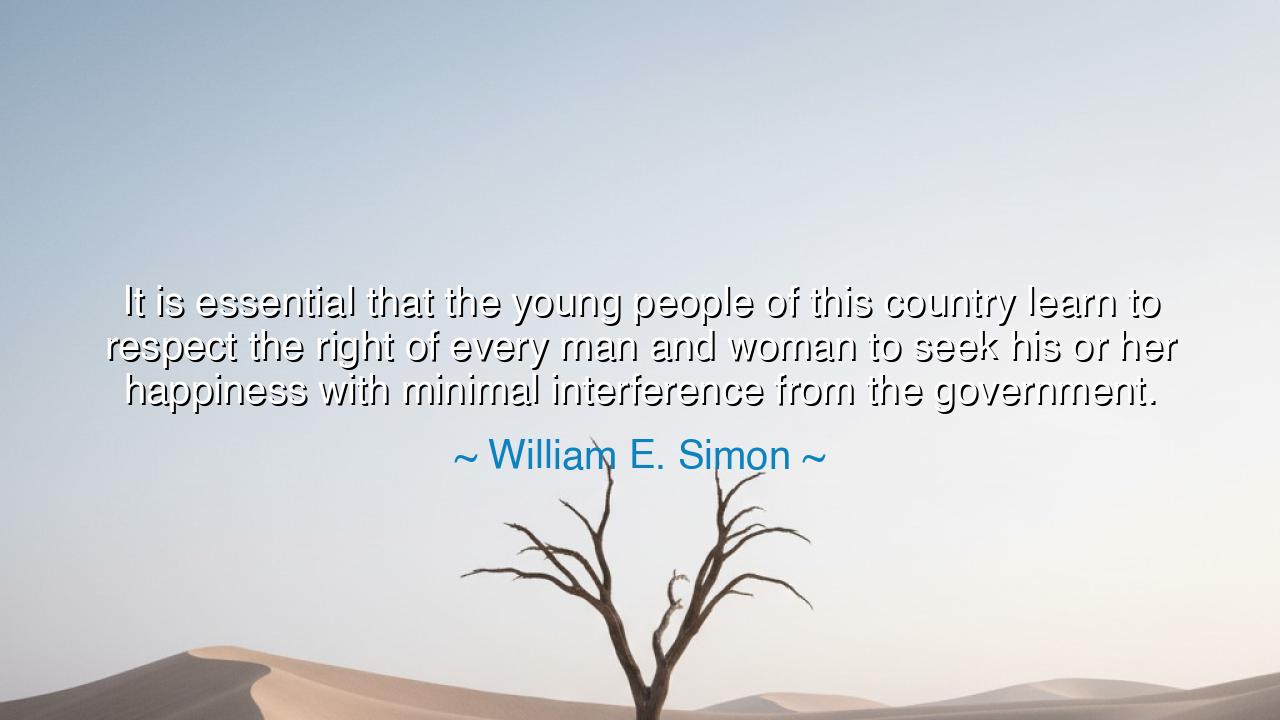
It is essential that the young people of this country learn to
It is essential that the young people of this country learn to respect the right of every man and woman to seek his or her happiness with minimal interference from the government.






When William E. Simon declared, “It is essential that the young people of this country learn to respect the right of every man and woman to seek his or her happiness with minimal interference from the government,” he was not merely speaking of policy, but of freedom, responsibility, and the sacred trust between the individual and the state. His words carry the weight of the American experiment itself—the bold idea that human beings are endowed not by rulers but by their Creator with the right to live, to labor, to dream, and to pursue happiness without undue restraint. In his statement, Simon reminds us that liberty is not a gift handed down by authority, but a flame guarded by the people themselves. And it is the duty of the young—the inheritors of tomorrow—to keep that flame burning bright.
The origin of Simon’s conviction lies in his life as both a public servant and a student of economic and moral philosophy. As the U.S. Secretary of the Treasury during a time of great uncertainty in the 1970s, he witnessed firsthand the dangers of excessive control—how governments, when reaching too far into the lives of citizens, can stifle initiative, crush enterprise, and weaken the spirit of a nation. To him, prosperity was not built by decree, but by the freedom of individuals to act, create, and strive. His call was not against the idea of government itself, but against the slow erosion of liberty that comes when people forget that their happiness cannot be engineered by bureaucracies. His words are both a warning and a celebration—a reminder that freedom, once lost, is rarely regained without struggle.
This belief traces its lineage back to the Founders of the Republic, who enshrined the pursuit of happiness as one of humanity’s unalienable rights. Thomas Jefferson, in crafting those immortal words, drew upon centuries of wisdom—from Aristotle’s virtue, to John Locke’s natural rights, to the ancient understanding that the individual soul must be free to find its purpose. Simon’s quote breathes new life into that same ideal, insisting that the next generation must not only inherit freedom but understand its moral weight. For liberty without virtue leads to chaos, and government without restraint leads to tyranny. Thus, he speaks as both economist and elder, reminding us that the balance between freedom and order depends upon the character of the people themselves.
History provides countless examples of what happens when that balance is lost. In the 20th century, entire nations surrendered their freedom in exchange for the promise of safety and equality. The philosopher Aleksandr Solzhenitsyn, writing from the gulags of Soviet Russia, described how quickly the human spirit withers when the government claims the power to decide who may live freely and who may not. The state that promises to guarantee happiness soon discovers that it must control all who pursue it differently. And so, in the name of progress, creativity dies, faith fades, and the individual becomes merely a cog in the machinery of power. Simon’s words rise as a counterpoint to this tragedy: a call for vigilance, for the preservation of a society where men and women may still choose their own destiny.
Yet Simon’s teaching is not a cry for selfishness, but for mutual respect. “Every man and woman,” he says, “must be free to seek happiness.” This is not an invitation to trample others in the name of liberty, but a recognition that true freedom depends on the dignity of all. Just as one’s right to swing an arm ends where another’s face begins, so too does one’s pursuit of happiness end where it harms another’s. The wise understand that the freedom of one soul is intertwined with the freedom of all. A nation’s strength, therefore, lies not in uniformity, but in the harmony of diverse individuals, each striving toward happiness in their own way, united by respect for the rights of others.
There is a parallel here to the story of George Washington, who, after leading the American Revolution, refused the temptation of absolute power. Offered a crown by those who would make him king, he instead chose to step down, returning to private life. His act became the ultimate expression of Simon’s truth: that freedom requires both restraint and faith. Washington understood that the happiness of a nation depends not on the dominance of its rulers, but on the virtue and independence of its citizens. He embodied the principle that government must serve liberty, not control it—a principle that Simon sought to preserve for the generations to come.
So, my children of the modern age, remember this: freedom is a discipline, not a luxury. Respect the right of every man and woman to walk their path, even when it differs from your own. Seek your happiness through effort, integrity, and courage—not through dependence upon the state or the will of others. For the government is a tool, not a master; it exists to protect freedom, not to dispense it. If you wish to honor your heritage, then guard your independence, think freely, and act with conscience. As William E. Simon reminds us, the secret of a thriving nation—and of a happy soul—lies in this delicate truth: that happiness cannot be given by power, only discovered by those who are free to seek it.






AAdministratorAdministrator
Welcome, honored guests. Please leave a comment, we will respond soon